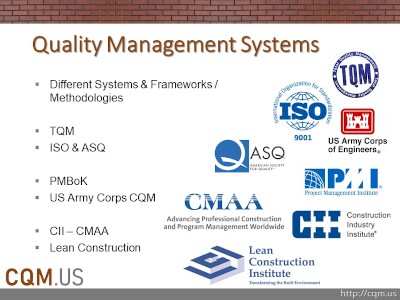Many books and websites can be found on the subject of Quality Management, but in regards to Construction Quality Management, we haven’t seen as many widely published best practices beyond a few research papers and guides. This can be attributed to the fragmented and dynamic nature of communication in the built environment industry, which involves many parties and can lead to confusion. Furthermore, construction is characterized by complex projects, often involving Project-Based Organizations (PBOs) and evolving Project Networks (PNWs), which are adapting to digital transformation. The inherent complexity and the continuous innovation in methods further highlight the need for robust quality practices.
CQM.US was established after the first breakfast panel by Project Management Institute Great Lakes Chapter held in Wayne State University sponsored by major Construction Companies and Members on November 19th, 2019. This initiative aligns with the Project Management Institute’s (PMI) commitment to support the project management profession, including specialized techniques for the built environment field through certifications like the PMI Construction Professional (PMI-CP)™.
Effective Quality Management (QM) in construction should be holistic, encompassing quality planning, quality assurance, and quality control, with the aim of ensuring conformance to requirements and fitness for use. It is also crucial for achieving strategic goals and objectives and ensuring that project investments lead to clear, sustainable benefits. A robust quality management approach inherently helps mitigate risks related to project performance and outcomes, aligning with the PMI principle of “Optimize Risk Responses.

Why hasn’t there been a Construction Quality Management Methodology?
The fast pace of innovations in Technology to improve Means and Methods in construction has indeed surpassed the ability to update a singular, universally adopted CQM Methodology for the industry. This is a common challenge in complex adaptive systems like organizations. Construction companies adapt their own practices when it comes to utilizing these best practices, based on their personnel abilities and knowledge. However, relying solely on individual company practices can lead to deficiencies if not guided by robust frameworks and continuous improvement.
The technological advancements, such as Building Information Modeling (BIM) and Digital Twins, are vital for virtual risk simulation, constructability reviews, and early identification and resolution of potential conflicts and quality issues before physical construction begins. Project Management Information Systems (PMIS), coupled with other digital technologies like IoT, field applications, AI, Big Data, drones, and robotics, enable real-time visibility, timely insights, and predictive risk alerts, enhancing project monitoring and decision-making during construction and execution.
The technological advancements, such as Building Information Modeling (BIM) and Digital Twins, are vital for virtual risk simulation, constructability reviews, and early identification and resolution of potential conflicts and quality issues before physical construction begins. Project Management Information Systems (PMIS), coupled with other digital technologies like IoT, field applications, AI, Big Data, drones, and robotics, enable real-time visibility, timely insights, and predictive risk alerts, enhancing project monitoring and decision-making during construction and execution.
CQM.US is in the process of gathering all these best practices to create a CQM Methodology that would best serve the need of Construction Companies. This endeavor aligns with PMI’s recognition that methodologies should be tailored to specific organizational backgrounds, circumstances, motives, and needs, rather than adopting a one-size-fits-all approach. Our approach will embrace adaptive and iterative methodologies, recognizing that plans and requirements evolve over time in complex construction environments.
A key aspect of developing such a methodology is establishing a “knowledge vault” or centralized repository for best practices, lessons learned, and historical data, which facilitates knowledge transfer and organizational learning. Our methodology will also integrate Commitment-based Management™ (CbM) as a core philosophy, driving actions and outcomes through effective, clear, and mutually negotiated conversations and commitments, which is particularly relevant for complex built environment projects. This iterative process of Assess, Plan, Implement, and Improve will ensure ongoing refinement and adaptation to unique organizational contexts and evolving needs.
CQM.US Forum
You will find Videos on YouTube and posts on LinkedIn in regards to Construction Quality Management. We ask that you participate in these social media outlets to engage in our discussions and improve our methodology. This active engagement supports effective stakeholder engagement and communication principles, ensuring timely and transparent information flow, incorporating feedback loops, and practicing active listening to understand diverse perspectives.
You will benefit by collaborating with like-minded people as well as sharing your knowledge and experience for the betterment of the construction industry. This fosters a culture of continuous learning, adaptability, and innovation within the community. Your contributions will directly feed into our “knowledge vault,” which systematically captures and archives quality and risk-related data, lessons learned, and solutions in a standardized, centralized, and retrievable format for future projects and benchmarking. This “increased communication” is recognized as a qualitative benefit for projects.
Meanwhile, please don’t hesitate to drop us a line at join@cqm.us or comment on any of our social media outlets to share your thoughts and resources you may like to share with the community. We value your input to enhance our understanding and support the growth of business analysis capabilities in construction.
Please follow and like us:
